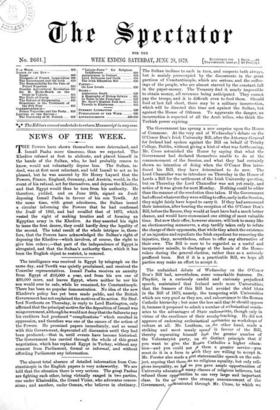The Government has sprung a new surprise upon the House
of Commons. At the very end of Wednesday's debate on the O'Conor Don's Irish University Bill, after the Attorney-General for Ireland had spoken against the Bill on behalf of Trinity College, Dublin, without giving a hint of what was forthcoming, Mr. Cross astonished the House by saying that what the Government had declared themselves unable to do at the commencement of the Session, and what they had certainly shown no intention of doing when the O'Conor Don intro- duced his Bill, they have determined to do now. The Lord Chancellor was to introduce on Thursday in the House of Lords a Bill for the settlement of the Irish University question, but on Thursday the Lord Chancellor was not yet ready, and notice of it was given for next Monday. Nothing could be odder than the manner of the resolution thus taken. If the Government had offered whatever they were willing to offer, early in th e Session, they might fairly have hoped to carry it. If they had announced their intention, after hearing the reception of the O'Conor Don's Bill, before the Recess, they would at least have had a much better chance, and would have economised one sitting of most valuable time. But now their offer, however sincere, will look to many like an electioneering manceuvre, a step tardily taken only to refute the charge of their opponents, that while they admit the existence of an injustice and repudiate the Irish expedient for removing the injustice, they, nevertheless, refuse to offer any alternative of their own. The Bill is sure to be regarded as a useful and inexpensive missile, to discharge at the heads of the Home- rulers during the general election, rather than as a seriously proffered boon. But if it is a practicable Bill, we hope all parties may make an effort to accept it.


































